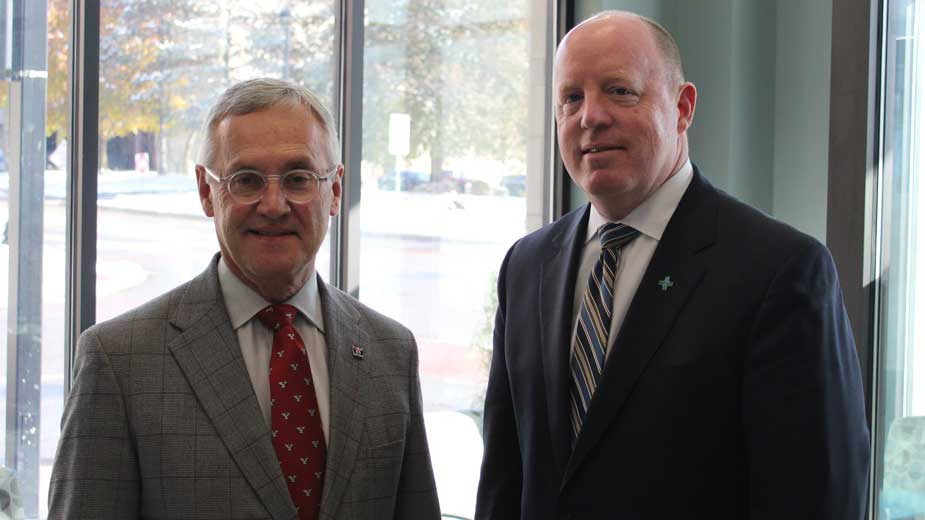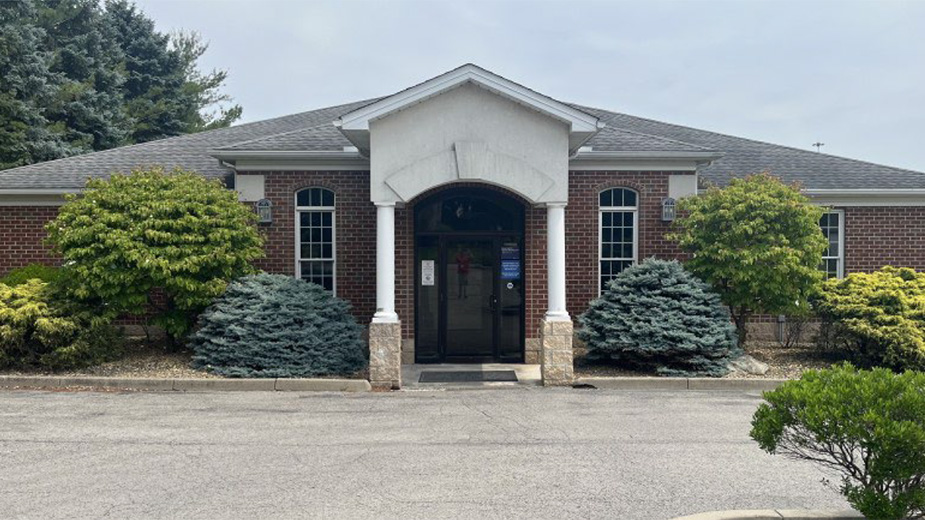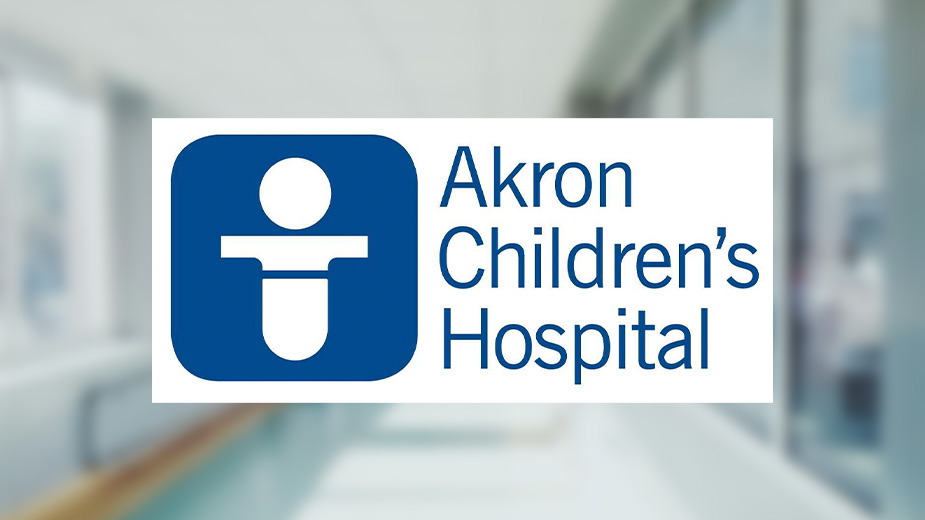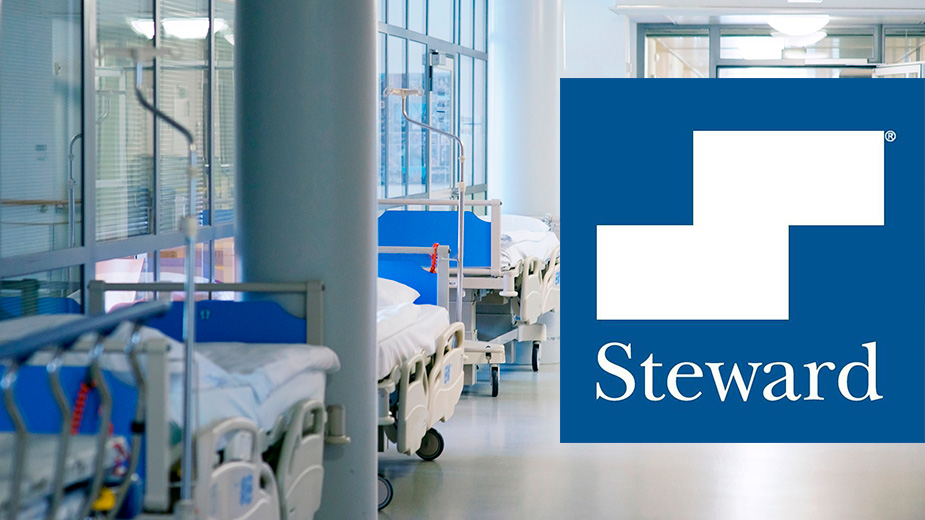Mercy-YSU Partnership Sets Stage for Growth
YOUNGSTOWN, Ohio — In the year since Dr. John Luellen assumed the position of president of Mercy Health-Youngstown, the health-care system has become as closely entwined with Youngstown State University as it ever has. And the partnerships that have sprung up in that time put both in a position to grow, their respective leaders say.
On his first day as president of Mercy Health-Youngstown nearly a year ago, Luellen announced the health-care system would open a clinic on the university campus.
The clinic, says YSU President Jim Tressel, was born of demand from students. In the 2018-19 school year, students approved the creation of a new $34 fee included in tuition, allowing all who attend YSU to use the clinic at no further charge.
“I’d consider it enormously successful,” Luellen says of Wick Primary Care, which opened in March. “This facility continues to grow and provide resources to not only students but the citizens of Youngstown. And since [opening], we’ve been able to leverage that relationship in a very positive way to move forward with a sponsorship agreement for Olympic sports.”
The clinic is used daily by students and area residents alike, and more could come soon. A large room still has no formal purpose and remains unfurnished.
Initially, Luellen says, plans were to use the room as a pharmacy. That remains a possibility, but it could also be turned into a physical therapy space, giving students in that program at YSU yet another space to work with the health-care system.
“You need to get experience. They have a partner in those clinical areas and experiential learning opportunities right across the street,” Tressel says. “We have busy students. We have a lot who are working two jobs, working hard in their curriculum and want to get experiences to prove what they can do.”
And with the growing health-care field in the Mahoning Valley, those students are in demand after they graduate, both at Mercy and other organizations.
But it isn’t just students coming out of the Bitonte College of Health and Human Services that Mercy needs, Luellen notes. As the largest employer in the area, there are plenty of nonmedical jobs available.
“There are the typical health-care positions like respiratory therapy and physical therapy and nursing. We also have a myriad of other employees: law-enforcement officers, for example, and people working in our pharmacies who aren’t pharmacists. We have business people working in our organization,” he says. “We’re just scratching the surface of the opportunities to align.”
Dating to his time as head football coach in the mid-1980s through the 1990s, Tressel says he saw the key to the success of YSU was working beyond its physical campus. It’s an opinion that’s only steeled since he returned in 2014.
In that time, among the list of organizations YSU has partnered with – either newly or in an expanded form – are the Youngstown Business Incubator, YSN Live, the city of Youngstown, Burgan Real Estate and, most recently, IBM.
“When we find great partners who really love to collaborate and look for ways to serve the region, it will do nothing but grow the region. We can’t just be an eight-month place,” Tressel says. “We have to be a place where there’s activity all the time, whether it’s in housing … or our sports programs. We need to be doing things 24/7/365 with as many partners as we can.”
For bigger schools, it’s not uncommon, Luellen notes, for universities to have their own medical systems.
The Wexner Medical Center at Ohio State University is consistently ranked as a top hospital for specialty medical care, including cardiology, cancer and orthopedics.
Across the state line, the University of Pittsburgh Medical Center is consistently ranked in the top 20 hospitals in the United States by U.S. News & World Report.
Those hospitals also serve as a training ground for the schools’ medical professionals.
To do something similar here, Luellen continues, would require a massive amount of resources that are better assembled through partnership rather than an institution trying on its own.
“We have an opportunity in our facilities for health-care providers to get hands-on patient care contact. The university provides an academic backbone that we can’t replicate,” he says. “If we can bring those together across the myriad of education opportunities, I think there’s no limit to the amount of good that can come of it.”
And that good stretches beyond the campus of Youngstown State or St. Elizabeth, Tressel observes. As the institutions in the area work together, it can create a snowball effect.
“Quality of life and activity is crucial to building an area. Health care is a huge part of quality of life. Education is a huge part of quality of life. Activities like the arts and things like Mill Creek Park create a good quality of life,” Tressel says. “We need to provide all that and attract more job opportunities. Working with great partners to develop that, I believe, will help us attract more business.”
While neither Tressel nor Luellen offer any concrete plans for what the future holds, both say that much more that can be done as the two organizations have become familiar with each other over the past year.
“We’ve become a financially stable health-care organization, which is unique to other providers, particularly those that are not-for-profit,” Luellen says. “We’ve been growing and at a rate that exceeds our expectations. As we have that stability, it gives us the opportunity to seek nontraditional partnerships to continue our growth.
Copyright 2024 The Business Journal, Youngstown, Ohio.



